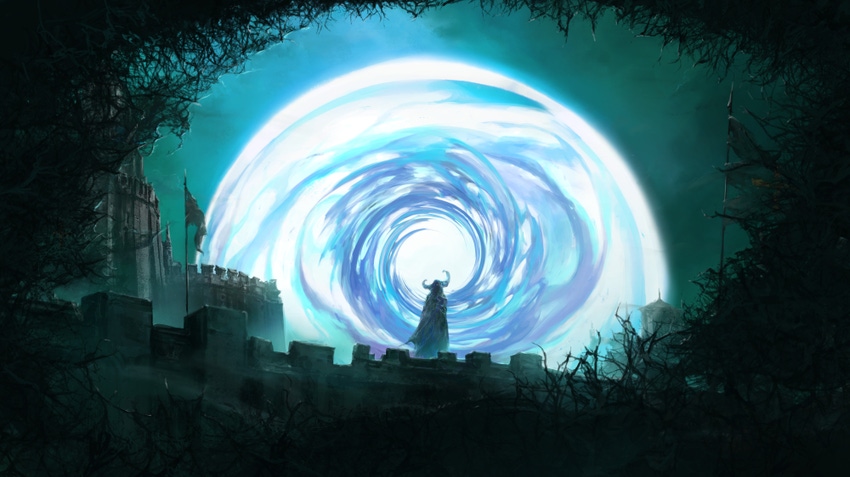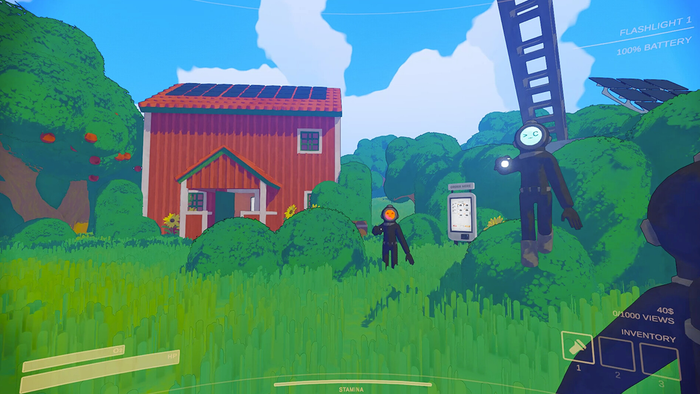
Featured Blog | This community-written post highlights the best of what the game industry has to offer. Read more like it on the Game Developer Blogs.
"We’re hoping that by being one of the first fully-remote AAA studios we can help forge the standard as to what that can look like."

Hey folks. To quickly introduce myself, I’m Jeff Gardiner, a 15-year industry veteran and a former project lead at Bethesda Game Studios with credits on games like The Elder Scrolls V: Skyrim, Fallout 3, and Fallout 4. After leaving Bethesda in 2021 and taking some time off, I decided to take a leap of faith and found my own studio, Something Wicked Games. We’re currently working on our first game, a preternatural open-world RPG titled Wyrdsong. Creating an open-world AAA RPG is a massive endeavor for any studio, let alone a startup studio still in its inception. Thankfully, we have a great leadership team, coupled with the passion and fortitude to make it happen. Something Wicked Games is being built as a fully remote AAA studio incorporated in both the U.S. and Canada to leverage the amazing talent found across North America, which will allow us to accomplish this task within the scope and vision of our mission and ship an amazing game.
I believe that in coming years we’ll see more independent fully remote studios as experienced people branch out on their own with ambitious game ideas. I also believe that for this approach to work, a studio must have a clear vision of studio identity, and a firm idea of what type of internal culture they want to build. Indies have been doing this for just over a decade, but doing this with a AAA studio is a herculean task. Building a successful game is one thing, but a successful studio has to be built with the long-term in mind, and that’s where crucial elements like studio culture, retention, creative autonomy, and more intangibles become linchpins of longevity.
Cultivating a talented, creative team is a task for everyone in a leadership position at a studio. Finding the “best” people doesn’t always mean simply hiring names that list big AAA games as line items on their resumes. Identifying team members who can draw out creativity, drive passion from within other co-workers, and build a positive studio culture is critical. Creating a results-oriented studio from the ground up, but also one that’s wholly remote, has added another wrinkle to that task. It has its benefits, of course, but presents some interesting problems to solve.
Our leadership team at Something Wicked Games - which includes some of the creative minds and leaders behind franchises such as Fallout, The Elder Scrolls, The Outer Worlds, and Dragon Age - always looks for certain things in our candidates, regardless of what role they’ll eventually play. While we keep skill and talent in mind, a passion for problem-solving and helping others is much more important when you hardly ever meet face to face. There has to be an alignment with your core values, the philosophies of your studio, and the way that you plan to actually produce your game.
Finding Common Ground
Something Wicked Games is still a fairly young studio. Our goal is for Wyrdsong to be a fully realized AAA open-world RPG. Still in its conceptual phase, we’re building up the gameplay prototype and our inspirations are starting to coalesce into a unified look and feel of the game.
Our team consists of 23 people, all of whom have been hired since June of this year. Many folks I’ve known and worked with over the years were excited about joining the studio. At Something Wicked Games, we’re making sure to hire people who align with our extant philosophies; the ways we think about making games. I feel it is these shared beliefs that keep studios held together like glue and I aim to create this cohesion at Something Wicked, even when our team is separated across a continent.
Our philosophies are best summed up as follows:
1. Storytelling and production take creativity and time - schedules are a tool, not a cudgel
We’re named after a famous quote from Shakespeare’s Macbeth, for good reason. The stories we tell ourselves and expose ourselves to affect us, they change our perception of reality. Many of our designers were huge literature nerds growing up, myself included (I took so many English classes in college that they stopped counting towards my total number of credits my senior year), and we’re still learning. We’re taking lessons on how “the bard” crafted his stories, and some of us are currently delving into “Alchemy & Mysticism” by Alexander Roob and “Life in a Medieval Village” by Frances Gies, as well as various works by Joseph Campbell.
Crafting a compelling story, one that subverts players’ expectations and approaches uncommon notions, is incredibly difficult, but it’s what we’re committed to. It takes a significant investment in yourself; we’re not only looking for folks with experience but who also understand the creative process - down to the fine details and methods used in its creation and how they affect anyone experiencing it. Our approach to narrative includes asking how stories can affect someone’s perception of reality and how they change the way we interact with the world. Incorporating these philosophical questions require layers of storytelling to use effectively.
Of course, we’re also taking influence from other RPGs, like early entries in the Ultima franchise’s approach to the Eight Virtues, and Elden Ring’s amazing sense of scale and exploration. All of this knowledge comes together in the development of Wyrdsong, and it’s something that we’ve looked for when growing our team. Personal developer experience is important, but there has to be some outside of the studio too.
We also expect incoming team members to have their own process. I’ve been privileged to spend the majority of my career in leadership positions where we set our own milestones and kept a constantly updated schedule. It’s an effective way to hold ourselves accountable and correct course whenever the mark is missed. I’m a firm believer that a schedule should be a tool, not a cudgel. So, we’re planning things in such a way that we can accurately scope and track our progress and deliver a great game while continuing to live rich, inspiring lives outside of the studio that can feed back into it. At the end of the day, we’re creators, and creators need time to be inspired inside and outside of the workplace.
2. Be authentic in your mission
Something I wholeheartedly believe about game development is that great games are shipped from studios where folks are not only passionate about what they’re working on but enjoy that experience as well. While our mission is to deliver a great, entertaining game, the best outcome depends on our developers enjoying that experience. That idea is paramount not only as we continue to build Wyrdsong but Something Wicked Games as a whole.
To do that, we have to continue to grow and maintain a positive work culture - as well as strengthen both personal relationships and a creative vision while the whole studio is remote. We also leverage the positive aspects of being a completely remote studio whenever we can. We have minimal core hours where meetings are held four days a week. On Fridays, the only time we gather is when we pick up a game to play together. Recently, we’ve been going through The Quarry as a group, and it’s become a great way for us to get to know each other as we all shout out our dialogue choices.
Along with these two philosophies around our development, our studio is designed around core values that we target with remote work in mind. These are things that aren’t just necessary to run a studio with members spread across the globe but to also develop a smart, mindful workforce that is able to produce creatively inspired, amazing results despite multiple barriers.

1. Trust
I know it might seem like a gimmie - you have to trust your coworkers regardless of where you work - but when a company is fully remote, trust is incredibly important. It’s something that’s established over time and with good communication, including something I like to call “constructive conflict.” When we have a disagreement, it isn’t just stated and business goes on as usual. We talk it out, whether it’s a problem with the design, art, a production methodology, anything, until we reach a conclusion that makes Something Wicked Games stronger in the end.
2. A sense of purpose
It’s difficult for a creative individual to operate when they simply feel like a tool or a cog in a larger machine, and that’s something that certainly can happen in this business. It’s why we see so much burnout. So instead, I want Something Wicked Games to make space for a person’s “best day ever” at work by offering creative autonomy. We hire experts in certain fields, set goals for them, and simply let them shine.
3. A sense of adventure
Game development is an adventure. We are a party of explorers, setting out on a quest, going into a dungeon filled with some elements of the unknown, challenges, and even scary beasts. We know there is treasure out there, and not just material rewards. There’s something valuable about the sense of awe members of our studios will get when they wear a Wyrdsong t-shirt to an amusement park and someone starts talking animatedly about it. If you’re really lucky, they’ll tell you about how the game changed their perspective, got them through hard times, or inspired them. That’s one of the greatest rewards crafting a game can offer, and I want everyone coming into the studio to know that what we’re making can achieve that.
The cost of doing business
In my twenty-plus years of helping ship games, I’ve never built a team like this. One that’s full of diverse individuals who’ve done more than just ship games themselves, they have a proven track record of success in doing so. While it is exhilarating, you have to keep an eye on “the bottom line,” and when you’re trying to make a AAA-quality title with a wholly remote studio, it is important to be creative in your financial approach.
To date, we have kept Something Wicked Games lean, picking and choosing the best candidates for us. Without overextending on staff, our overhead remains low, and we can lean on our collective experience in building, scheduling, and budgeting big open-world games. At the moment, we have employees in California, Maryland, Washington, Virginia, Minnesota, Michigan, and Maine, as well as Montreal, Toronto, and Vancouver.
With our low overhead operating in North American time zones, we are able to maintain efficient communication and limited core hours. As a bonus, we have the budget for a yearly get-together, which will help us continue to build solid communications, grow trust, and share inspiration. This will further establish the bonds we build in Something Wicked Games’ digital creative environment.
Down the road, we have plans to expand Something Wicked Games in an exciting way. Wyrdsong is set in Portugal, and we knew that it’d be important to set up shop there. It’s a magical country that’s underrepresented in most media, and we feel we can tell a great story there about the formation of the Knights Templar. So, we’re looking to form a remote Portuguese studio to help us build our game, simultaneously doing justice to the authenticity of its setting and helping up-and-coming game developers get their careers started.
Conducting Something Wicked Games as a remote business, with a core team set up across a few time zones and another auxiliary team, we will be able to self-regulate and truly hold ourselves accountable. It’s a part of ourselves that we’ll want to keep intact as we look into partnering with investors and publishers. With an actualized full schedule that gets clearer as we refine it, we set milestones, re-scope, and solidly define the experience of Wyrdsong as we shift fully into development. Through smart early content cuts, reasonable scoping, and hiring the right individuals for the job and our studio, we’ll be able to deliver something truly unique.
Remote impact
The team at Something Wicked Games is charting a course through territory that we know well. As of right now, we haven’t just shipped games, but done it successfully, over and over again. We have experience developing amazing games on limited budgets and within reasonable timelines, and we will do it again with Wyrdsong. Our challenge this time will be doing it all while seeing each other in person maybe once or twice a year.
That challenge is why studios looking to set up full remote AAA development should focus on onboarding talent that closely aligns with their philosophies, values, and principles. We�’re building a studio family first, one with a strong sense of culture that empowers passionate people but does not exploit them. Building any team requires not only clearly defining the game experience, but your culture as well. And when that studio is fully remote, those clear definitions become even more crucial.
The studios that will be built in the upcoming decade as leadership branches off will produce incredible games that go beyond what we think is possible today. We’re hoping that by being one of the first fully-remote AAA studios we can help forge the standard as to what that can look like.
Read more about:
Featured BlogsAbout the Author(s)
You May Also Like







